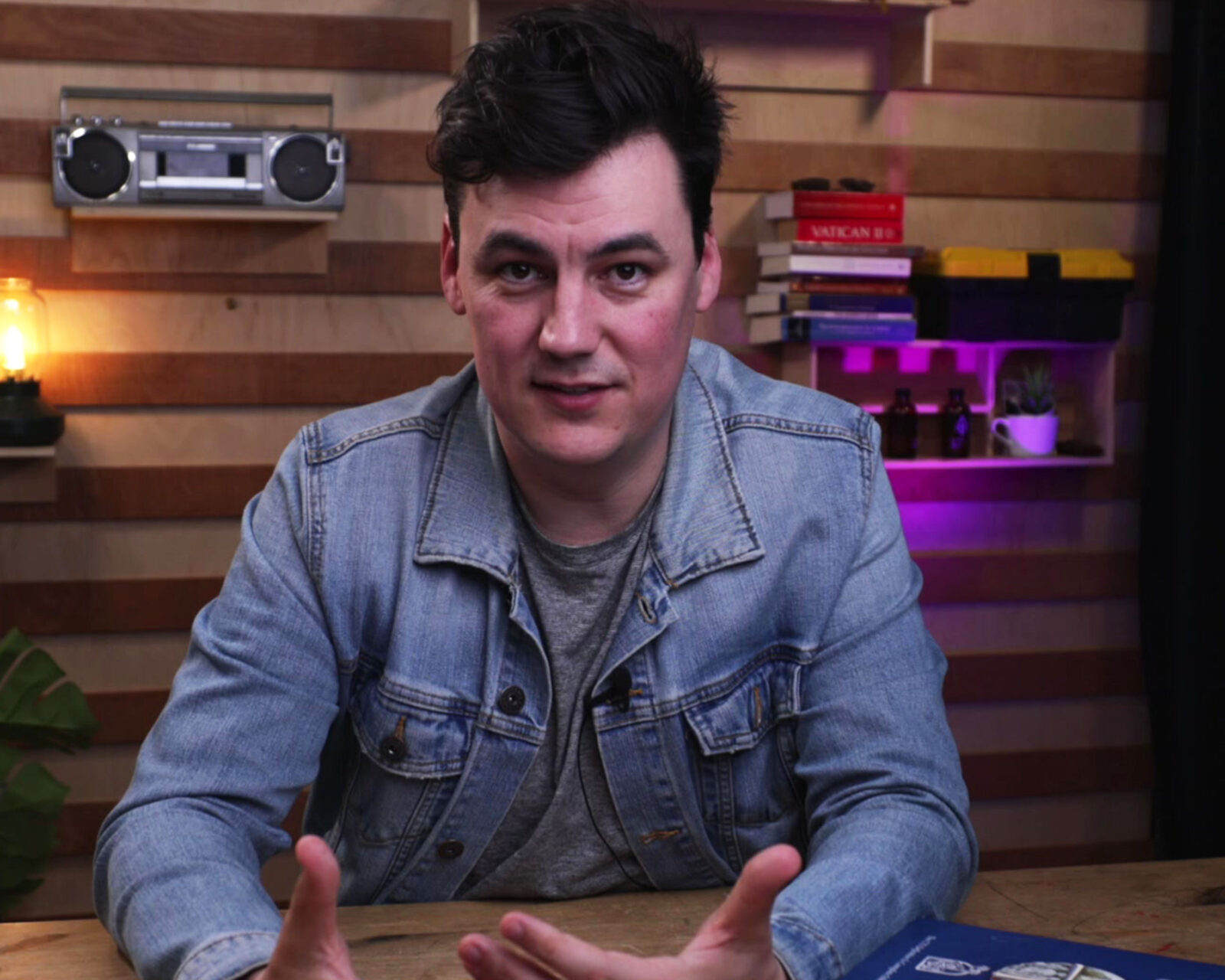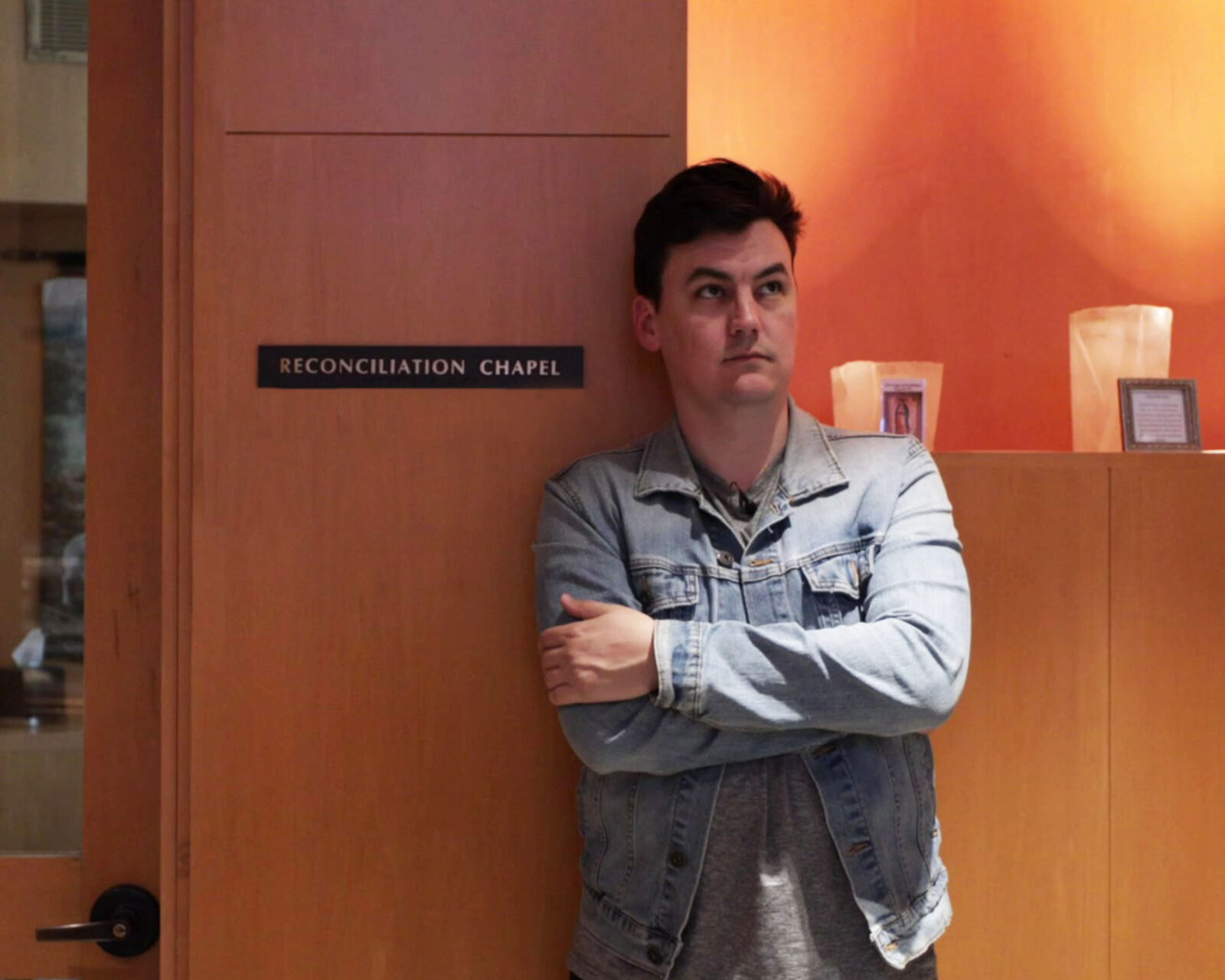How sins are forgiven through the Sacrament of Reconciliation
Explanation

When you feel prompted by the Holy Spirit, don’t be afraid to seek healing and forgiveness through the Sacrament of Penance.
WatchIs Catholic guilt real? How should we respond when we feel guilty?
Explanation

When you feel prompted by the Holy Spirit, don’t be afraid to seek healing and forgiveness through the Sacrament of Penance.
WatchConnection

Talking to Jesus, inviting the Holy Spirit into our hearts, and making an Examination of Conscience are great ways to get our hearts ready.
WatchConnection

Jesus wants us to experience his mercy through his priest who exercises the power of forgiveness that Christ gave the Church in the Sacrament of Penance.
WatchNarrator: In an interview with the Los Angeles Times, Omar Apollo – who was raised Catholic and nominated for a Grammy – was asked directly about whether or not his Catholic faith has had a place in his songwriting. He answered this way:
“I used to have an insane amount of, like, Catholic guilt. Totally. And I was afraid to say certain things in my music because of it.” Omar went on to explain that swearing or making music about certain things made him feel guilty.
It’s interesting Omar felt a lot of guilt, some coming from his childhood, his family, and his experience of the Catholic Church and its teachings. In an episode of 30 Rock called “The Fighting Irish” Jack Donaghy, played by Alec Baldwin, says “There is a crushing guilt that comes with being a Catholic. Whether things are good or bad or you’re simply… eating tacos in the park, there is always the crushing guilt.”
Catholic guilt even has its own wikipedia page. It says, “Catholic guilt is the reported excess guilt felt by Catholics and lapsed Catholics.”
Where do these feelings of guilt come from? And how do we deal with these feelings?
We should make a distinction between guilt and shame. Guilt and shame share similar neural networks in the frontal and temporal areas of the brain but their patterns are very different. Guilt occurs when our behavior conflicts with our conscience. Shame is triggered when we think we’ve damaged our reputation, or when we experience a fear of embarrassment.
During fMRI studies, German scientists from Ludwig-Maximilians-University in Munich found that shame set off high activity in the right part of the brain but not in the amygdala. The right side of the brain handles memory, reason, and problem solving. In the guilt state, there was activity in the amygdala and frontal lobes but less neural activity in both brain hemispheres. The amygdala handles things like threat responses.
Brene Brown, author and famous TED talk presenter, said this about guilt and shame:
“I believe that guilt is adaptive and helpful—it’s holding something we’ve done or failed to do up against our values and feeling psychological discomfort. I define shame as the intensely painful feeling or experience of believing that we are flawed and therefore unworthy of love and belonging—something we’ve experienced, done, or failed to do makes us unworthy of connection. I don’t believe shame is helpful or productive. In fact, I think shame is much more likely to be the source of destructive, hurtful behavior than the solution or cure.”
Economists and neuroscientists researched this by creating an economic game designed to test the theory of guilt aversion – our desire to avoid the negative feelings of guilt. In the game, some participants are “investors” and others are “trustees.” Investors were asked to award a certain amount of money to trustees. The trustees were told that the investors expected a certain amount of money back. Then, while in an fMRI machine, the trustees’ brains were scanned as they decided how much money to return to the investors.
What they found is two rather distinct neural structures are at play when we’re deciding whether or not to honor someone’s expectations. The neural structure underlying our desire to avoid guilt activates when we’re making a decision to cooperate with others.
Guilt is connected to a desire to maintain our relationships with others and to uphold a moral code. Psychologist Jena Field explains that guilt is focused on behavior, and this is why researchers call it a moral and adaptive emotion. Whereas shame is more focused on identity. She says, “Shame causes a fear response that makes us either get defensive or hide, which doesn’t allow us to step back and see what we can do differently.” Shame causes us to avoid looking inside or acknowledging mistakes, because if we do, then we’re agreeing with a narrative that we’re “bad” or “not good enough.”
Gerald Fishkin, a psychologist and author of The Science of Shame, explained this more simply. Guilt is associated with the logical-thinking part of the brain. Where shame is more emotionally raw and doesn’t typically involve processes like logical thinking or reasoning. For example, in relationships guilt can cause us to seek out restoration or to avoid wronging others. Shame is more associated with social embarrassment and can lead us to avoid others or hide.
There’s a common misconception that Catholics have more guilt than most people. A study in Psychology of Religion found that Catholic participants demonstrated a higher level of constructive guilt reactions than other groups. But this doesn’t mean that Catholics, or religious people in general, experience “more” guilt.
Researchers from the University of California, Berkeley and from the University of Notre Dame examined the concept of Catholic guilt among U.S. teenagers. The authors found no evidence that Catholic teenagers experience more guilt than non-Catholic teenagers. They also expressed that Catholicism both caused and relieved less guilt than other religious traditions. The authors did not find that more observant Catholics feel guiltier than less observant Catholics. The study also noted no difference in the effect of guilt-inducing behaviors on Catholic versus non-Catholic participants.
Omar Apollo went on to explain during the interview that he eventually realized “These aren’t my thoughts… I have my views and live by my own moral code.” Maybe we use the terms “guilt” and “shame” too interchangeably. Maybe Omar wasn’t just feeling “guilt” but some shame about his songs or choices. It leaves us wondering if he’d then feel guilt if he wasn’t living by his own moral code.
What do we do with our feelings of guilt and shame? It seems clear that these feelings are a part of human nature, but they require us to seek out some form of restoration. In the context of relationships, it seems clear we should respond to guilt by seeking to restore any damage done. But what about guilt we feel about actions that don’t involve others? Should we just change our moral code, or seek restoration some other way?
U.42 — CCC 2807-2815

Ambassadors have shaped history. What do their actions reflect about the authority and responsibility of the leaders they serve?
WatchU.41 — CCC 2759-2806

Family traditions connect us to our roots, uniting us through cherished practices and linking us to a greater story.
WatchU.40 — CCC 2697-2758

In our personal relationships, professional life, or spiritual journey, small but consistent actions can create big, lasting change.
WatchU.39 — CCC 2650-2696

Is any art truly original, or is everything built on the foundation of what came before?
WatchBy submitting this form you consent to receive emails about Real+True and other projects of OSV.